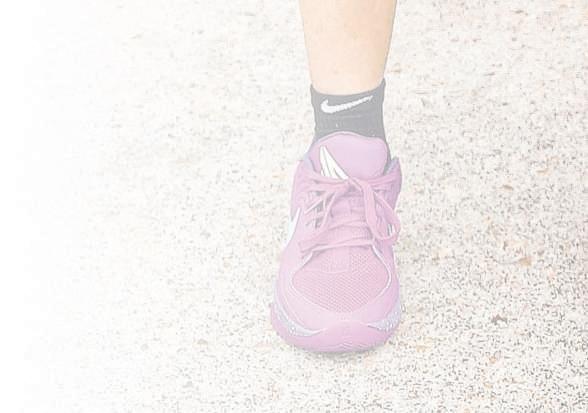























































































MLK Day 2025 (Jan. 20) is already set to be one for the ages. Why? Because in the irony of ironies, the annual day set aside to honor Reverend Dr. Martin Luther King Jr., our “Drum Major for Justice,” will see this nation inaugurate arguably an unjust person to serve as POTUS. Whatever adjectives you ascribe to MLK’s life and legacy—courageous, sincere, righteousness-seeking, spiritually-grounded, humanity-serving, etc.—Donald Trump is the living embodiment of the exact opposite.
Yet, the two fgures and all they stand for will be intertwined for all the world to see come Martin Luther “the” King Day 2025.
I say, we Blackfolk, really give the world something to see. At the very least, we need to shout an inspiring message to ourselves.
And what message is that? It’s Nation time! As in, Black people fully committing to building and doing for self.
To do that, MLK Day 2025 needs to be more Malcolm X than Martin.
What do I mean? King is erroneously classifed as someone who fought for integration, meaning living next to and going to school with whites. A more accurate read of MLK’s movement shows that he believed Blacks should enjoy all the rights, protections and privileges that come with being citizens of this
nation. Tat’s not necessarily integration.
And sure, MLK said, “I fear I may have integrated my people into a burning house.” But the movement for which he served as spokesman was for equal access. Period. Blackfolk had less desire to live next door to whites than whites had to live near Black people. We simply wanted equal access and MLK called upon the engines of government to deliver that access to its darker citizens.
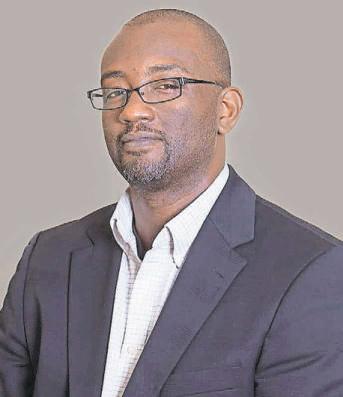
Aswad Walker
Malcolm X, like MLK, wanted for Black people all the “things” (quality education, protection from violence and the freedom to fully enjoy life, liberty and the pursuit of happiness). However, unlike MLK, Malcolm had little faith that a white-led, white-controlled institutional power system would deliver those supposed constitutional rights to Black people. Instead, Malcolm called for Black people to build those structures, opportunities and institutions for ourselves. Brother Malcolm called for self-determination—Black people building and doing for self.
Months away from Trump’s inauguration, he was already bragging that he
has 350 executive orders lined up and ready to be unleashed on Day 1. Tat’s 350 MAGA-driven, Project 2025-inspired orders that will go into efect immediately without needing congressional approval.
Publicly, he’s downplaying his Day 1 plans.
But according to his campaign rhetoric, cabinet appointments, and promises of “retribution and revenge,” there’s much more to those executive orders than simply addressing economics and energy issues.
In other words, on MLK Day 2025, Trump is ready to “let injustice roll down like water, and white violence and revenge like a mighty stream” (to paraphrase one of MLK’s favorite scriptures). Tat day will mark the ofcial end of the Second Reconstruction, the period of rising protections, rising expectations, rising incomes and opportunities for Black people. All are protected by law.
On MLK Day 2025, as soon as Trump’s inauguration festivities are done, he’ll begin ofcially ending all legal protections and programs that protected Blackfolk from pre-1960s Jim Crow-level injustices.
It’s going to get ugly.
Back in the day, MLK deployed marches and protests as part of his strategy to win Blackfolk equal access for multiple reasons. The goal was to tap into enough white guilt and white humanity to inspire policy changes to beneft Blackfolk.
But today, there’s no white guilt or white humanity to tap into. This past presidential election showed all that exists in America now is white anger, hostility and grievance. Tey believe the job losses, factory shutdowns, and opioid addiction they’re facing are because Blackfolk stole “their” America. And they want us to pay for their pain.
Brother Malcolm called for a diferent strategy, one we should heed today – build our own institutions to cover our own needs. No protesting required.
Malcolm recognized the critical importance of Black people doing our own thing. But come to think of it, so did MLK. In fact, during those last three years of his life (1965–1968), MLK ofen sounded more like Malcolm than Malcolm, declaring “Black is beautiful,” and calling Black people to bank Black and buy Black.
In reality, MLK Day 2025 should represent both Malcolm and Martin. Each charged us to move toward self-determination, resurrecting the power we used to create the world’s frst civilizations. We can do it again.
By Aswad Walker
Don’t get it twisted. Activists’ voices still make a difference.
The Defender was recently informed by a member of Mayor John Whitmire’s staff that the Houston Police Department (HPD) posted to their X account that Officer Deven Ortiz is no longer employed by HPD. That outcome never would have happened had it not been for activists from multiple organizations uniting in front of Houston City Hall, demanding the removal of Ortiz.
Ortiz, worked as a detention officer at the Harris County Jail for 25 months. In that short span, Ortiz was the subject of “multiple Internal Affairs investigations.” The Harris County Sheriff’s Office’s disciplinary board recommended termination.
Before a move was made to terminate Ortiz, he resigned in April 2024. In that same month, Ortiz entered the Houston Police Academy and graduated as a probationary officer in November.
Shortly thereafter, a video from inside the jail of one of those incidents came to light. It showed Ortiz pushing a handcuffed

female inmate into the wall, slamming her to the ground face-first, then yanking her off the ground and slamming her back into the floor again. According to the sheriff’s office, that particular event took place on Jan. 17, 2024, while Ortiz was escorting the inmate to court.
Tammie Lang Campbell, founder and executive director of the Honey Brown Hope Foundation, and others questioned
why an individual with such a background was even considered a viable candidate by HPD.
“Houston is in a crisis of trust and denied justice,” said Campbell. “Too many law enforcement officers sworn to protect and serve are breaking the law themselves. Yet, their badges shield them from accountability, leaving our communities betrayed and broken.
“The case of Deven Ortiz shows us what happens when bad officers are shuffled from one agency to another. It’s a dangerous cycle that erodes trust and threatens public safety,” added Campbell.
“As you look at the video and see how egregious this person is in their actions, also notice that nobody who was around him, his co-workers, tried to stop him,” said Cynthia Cole, executive director of the American Federation of State, County and Municipal Employees (AFSCME) Local 1550.
Activists are also curious to see how HPD leadership and Mayor John Whitmire, who ran a “tough on crime” mayoral campaign, respond to their calls for Ortiz’s termination.
“Today, we call on Mayor Whitmire, Sheriff Gonzalez, and Police Chief Diaz to prioritize transparency and accountability. We need full disclosure of officer misconduct, independent oversight by a civilian review board and ethical leadership that demands the highest standards from law enforcement,” she stated during that press conference weeks ago. That accountability was shown in HPD’s decision to end Ortiz’s employment.
By Tannistha Sinha
The City of Houston plans to impose regulations on the short-term rental market, like registering property with the city and paying a fee starting at $250-$275. The market includes properties on websites like Airbnb and the Expedia Group, as well as landlords and neighbors in certain neighborhoods.
Other requirements include complying with the Code of Ordinances regarding noise and sound levels, solid waste and litter control requirements, paying a hotel occupancy tax, and having a $1 million liability insurance policy effective during rental availability.
“We don’t want to ban short-term rentals because that would be illegal and unconstitutional,” said city council member Julian Ramirez. “What we want to do is get at the bad actors, the folks who are not following the rules, who are allowing tenants to disrupt the lives of others in the neighborhood who are conducting illegal activities out of the shortterm rentals.”
The regulations require short-term rental owners to disclose the:
• maximum number of occupants,
• emergency and non-emergency information,
• the address to the nearest hospital or urgent care,
• location of the nearest fire station,
• floor plan with evacuation routes and safety measures,
• a 24-hour emergency contact person, and
• A conspicuous location, among others.
The guide says short-term rental (STR) registrations can also be revoked under certain circumstances and violators would face daily fines of $100-$500.
Landlords have expressed concerns over delays in registration approvals and inquired if homes can be rented while approvals are pending. Another asked if the city would consider an amendment grandfathering those who already pay Hotel Occupancy Taxes (HOT) so they can continue operating until they receive their certificates.
Also, since landlords do not get receipts from the platforms for paying these taxes, what proof can be offered to the City? They also said $1 million proof of insurance is too high and requires the landlord to be on one of the two major platforms to get this level of coverage, and will therefore be a barrier to entry and use of homes.
Landlords, Airbnb, and Expedia Group also objected to landlords’ criminal liability for tenant actions, citing their lack of control

Short-term rental owners must provide emergency information and can face fines for violations. Credit: Getty
and knowledge over a tenant’s activities. Therefore, they did not agree to be held liable for those actions.
Derek Nesbitt, an Airbnb owner in Houston who started her business in the city in December 2023 and owns two Airbnb properties, said these regulations are important to implement.
“I know a lot of city and states are not necessarily trying to ban Airbnb, but trying to avoid doing that, the best option would be to have these regulations set in place… It’s just more so a safety net for the community,
the neighborhood, and the city itself.” Nesbitt said. “I believe it will only affect Airbnb owners if they do not comply or if their market is not a large market. So if their audience is not pretty big, then I could see it affecting them because now they have to pay all of these extra fees where they’re barely surviving because their market isn’t so big.”
By Tannistha Sinha
Congressman Sylvester Turner is headed to Washington D.C. to represent Texas’ historic 18th Congressional District afer being sworn in on Jan. 11. Te Houston Defender got an exclusive interview with the Congressman before he departed for Washington, D.C. Turner listed the issues he plans to prioritize and discussed the political environment in the U.S. House of Representatives.
Working with a conservative Congress
When asked if he could work with the conservative Congress and the newly elected president, Turner said he “found ways” to work alongside President Donald Trump when Hurricane Harvey hit Houston in 2017 and has had similar encounters in his political past.
“In 2003, when the Texas House, the Texas Senate, and the Governor were all Republican-controlled,” Turner said. “Democrats were the minority. I found a way to work with them, and we were still able to advance measures that were in the best interest of the districts… We’ll stand frm on the values and the things that are important to the people in the 18th. If they bring up things that are the antithesis of what’s in the best interest of the people in 18th, I have no problem standing up and opposing and doing everything I can to prevent those measures from becoming a reality.”
Turner’s top priorities during the term
Former Congresswoman Erica Lee Carter, daughter of the late Congresswoman Sheila Jackson Lee, who completed the remaining days of her mother’s term in ofce, said the historic district grapples with several issues.
“I look forward to seeing him (Turner) standing strong in the face of a lot of challenges on the federal level and always keeping Texas frst,” Carter said. “You still have to work where there is an opportunity, and there may be an opportunity
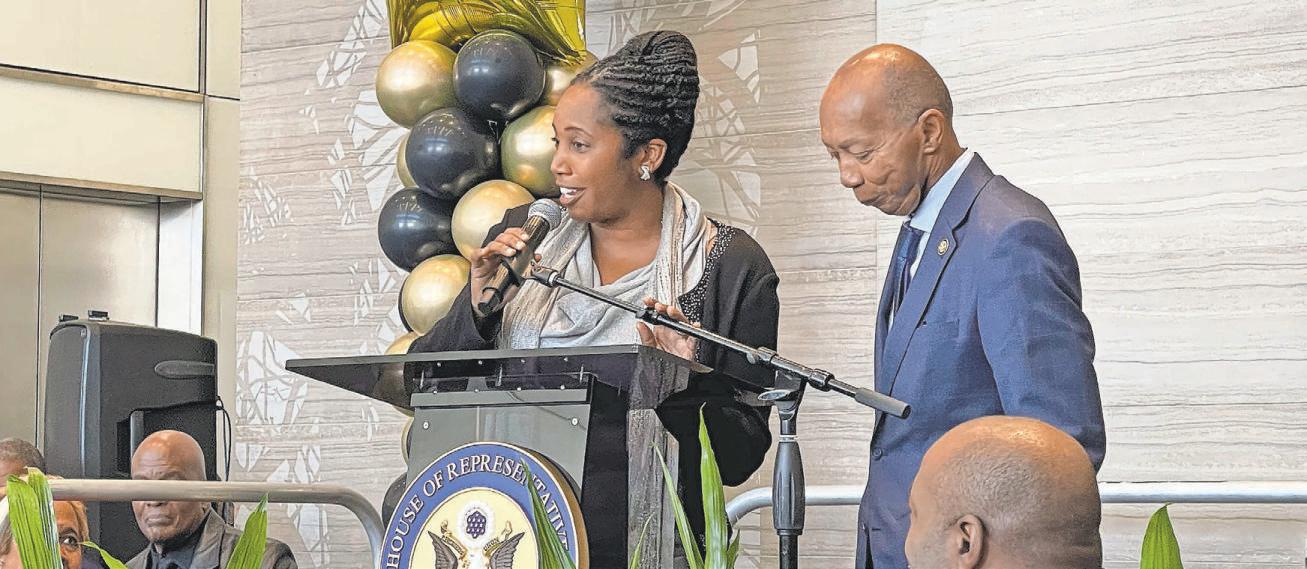
on criminal legal system reform, healthcare, which is a passion of his, the cancer cluster, environmental toxins, (and) so many other challenges. I know that he is committed to addressing those.”
Turner said health care is a top issue because Republicans have indicated they want to get rid of Obamacare, which he “strongly opposes.” Considering his recent health challenges, he said he would work on expanding Obamacare, lowering premiums to make them afordable, and elevating the quality of life for 18th district residents, whose life expectancy is signifcantly lower than that of other zip codes.
“Healthcare would be number one,” Turner said. “And then, you have the environmental injustice issues springing out of Fifh Ward and Kashmere Gardens area with the cancer cluster.”
Turner said he will address infrastructure issues and the shortage of affordable housing, including high mortgage rates and insurance, in an upcoming meeting with the National League of Cities in DC this week. He also referenced the combined $382 million Houston and Harris County will receive from the U.S. Department of Housing and Urban
Development (HUD) for recovery eforts from Hurricane Beryl and disaster resiliency.
“We need infrastructure because people in marginal communities, especially in the 18th are in the constant state of need and recovery areas that are fooding,” Turner said. “Te cost of housing is continuing to rise, driving people out of their neighborhoods or onto the streets in a state of homelessness. I want to do everything that I can in working at the federal level to provide more afordable housing.”
ISSUE: Economic development, jobs and entrepreneurship
Turner will prioritize economic development and the creation of well-paying jobs, as well as supporting entrepreneurs.
“We need to work with the Small Business Administration and others, working with the industry and the private sector to create good paying jobs for people to take care of themselves and their families,” he said.
Addressing a rumored rift between Turner and current Mayor John Whitmire, Turner referenced his former mayoral race opponent, Bob Lanier. In 1991, Turner was in the state legislature when Lanier became mayor.
“He [Lanier] and I worked
together,” Turner said. “It’s all about what’s in the best interest. I’m prepared to work with this mayor and his administration in the interest of people in the 18th and Houston in general. But it is important that when we work hard on the congressional federal level to bring resources to the city and to the 18th that those dollars are utilized for the very purposes which they were intended.”
Turner stated that his job is to “bring back federal dollars” and ensure the appropriate utilization.
Serving his constituents
Refecting on his term, he said he will build on the legacy lef behind by Barbara Jordan, Mickey Leland, Craig Washington and Sheila Jackson Lee but will also bring his perspectives. He added he will host town hall meetings with his constituents to engage with the community
“I can’t think of anyone in the state of Texas who has been a legislator, mayor, and now a member of Congress,” he said. “I think I bring my own unique experiences and perspective to the 18th Congressional District.”
VOLUME 94, NUMBER 13 - JANUARY
By BRITTNEY MORNING, MD
Your thyroid is a small gland in your neck that plays a big role in keeping your body healthy. It produces hormones that regulate key functions like metabolism, energy levels, and heart rate. When the thyroid isn’t functioning properly, it can cause symptoms such as fatigue, weight changes, mood swings, and more.
Millions of Americans live with thyroid conditions. The two most common are hypothyroidism (underactive thyroid), where the gland doesn’t produce enough hormones, and hyperthyroidism (overactive thyroid), where it produces too much.
The good news is that early detection through routine screenings can identify thyroid imbalances before they become serious health concerns.

Brittney Morning, MD is a board certified family medicine and primary care physician who cares for patients at Kelsey-Seybold’s Rosenberg Clinic.
Scan to view Dr. Morning’s online profile.
Thyroid health is important for everyone, but for African Americans, managing thyroid issues can come with added complexities. Conditions like heart disease and diabetes — which are more common in this community, can make it harder to identify and treat thyroid imbalances.
Additionally, the risk of autoimmune thyroid conditions like Graves’ disease (Hyperthyroidism) is greater in African Americans, while the risk of Hashimoto’s thyroiditis (Hypothyroidism) is lower.
Don’t Ignore These Warning Signs
Thyroid disorders can develop slowly and show up in ways that are easy to dismiss. Taking them seriously and talking to a doctor could mean faster treatment. Symptoms include:


• Feeling unusually tired or sluggish
• Unexplained weight gain or loss
• Thinning or loss of hair
• Rapid or irregular heartbeat
• Changes in mood, such as increased anxiety or depression
These symptoms can affect many aspects of daily life, but they don’t have to. A simple blood test and screening can provide clarity and guide you toward an effective treatment.
Learn more about thyroid health or schedule a screening by visiting kelseyseybold.com or speaking with a KelseySeybold physician.
Call 713-442-7025 or visit Kelsey-Seybold.com to schedule an appointment.






In his farewell address to the nation, President Joe Biden delivered his final formal speech before handing over the presidency to President-elect Donald Trump.
In his previous Oval Office address six months ago, Biden shared his decision not to seek reelection, focusing on a momentous tenure marked by unprecedented challenges and significant achievements. During his presidency, Biden navigated the country through a severe pandemic, economic upheaval, and a direct assault on democratic values, efforts that he says unified and strengthened the nation.
“Four years ago, we stood in a winter of peril and a winter of possibilities,” Biden said as he prepared for departure. He emphasized that despite the worst pandemic in a century and economic crises not seen since the Great Depression, “We emerged stronger, more prosperous, and more secure.”
Under his administration, the U.S. has created 16.6 million new jobs, significantly reduced inflation, and had the lowest racial wealth gap in two decades. Biden highlighted the revitalization of manufacturing, leadership in global science and
Metropolit a n T r a nsit Authority of H arris Co un t y, T ex a s
The Metropolitan Transit Authority of Harris County, Texas (METRO) is holding a public hearing to receive public comments on its State Performance Audit for Fiscal Years 2020 through 2023 and METRO management responses. The audit will be presented during the public hearing held at 12:00 p.m. on Tuesday, January 21, 2025 in the METRO Boardroom on the second floor at 1900 Main Street in Houston, Texas 77002.
The public is invited to attend the hearing and provide comments in person. You may also join the hearing on Zoom at https://us02web.zoom.us/j/81007989871 or by dialing: +1 346-248-7799 or 888-475-4499 (toll-free), Webinar ID: 810 0798 9871
Participation on Zoom is only necessary if you want to provide comments during the public hearing. The public may also view a live stream of the meeting online at https://www.RideMETRO.org/about/board-meetings. A video recording of the hearing will also be archived on the same page.
A copy of the State Performance Audit and METRO management responses are now available for review by the public on the METRO website at RideMETRO.org/PublicHearing and in the lobby of the METRO RideStore in the Lee P. Brown METRO Administration Building, located at 1900 Main Street, Houston, Texas 77002.
It is recommended that anyone wanting to make public comments register as a public speaker with the METRO Board Office at least 48 hours in advance of the hearing by calling 713-739-4834 or sending an email to BoardOffice@RideMETRO.org, and providing their name, address and telephone number. If you pre-register, your comments will be heard first at the public hearing. Your name will be called at the appropriate time for you to make your comments.
technology, and substantial healthcare reforms, including reducing prescription drug costs and expanding health insurance coverage.
Biden also pointed to legislative successes, such as significant veterans’ health and climate laws, and the first major gun safety law in nearly three decades. “Today, the violent crime rate is at a 50-year low,” Biden added, underscoring the safety improvements during his term.
Reflecting on his presidential campaign’s central message, Biden reiterated, “I ran for president because I believed that the soul of America was at stake.” He maintained this belief, praising America as an idea of equality and rights stronger than any force and broader than any ocean.
Concluding his letter, Biden expressed his gratitude for the opportunity to serve, describing his journey from a modest upbringing to becoming the president as the “privilege of my life.” He encouraged Americans to continue building on the progress achieved, ending with a call to unity: “We are the United States of America, and there is simply nothing beyond our capacity when we do it together.”
Alternatively, if present in the boardroom you may provide public comments after the pre-registered speakers by raising your hand when called upon, by selecting the “Raise Hand” feature on the Zoom platform online or by pressing *9 if joining by telephone. Those calling in will automatically be placed on mute. After an unregistered speaker’s name or number is recognized, their microphone will be unmuted and they will be able to provide their comments.
The public may also provide comments by calling the METRO Customer Contact Center at 713-635-4000 in advance of the public hearing.
Upon request, METRO provides free language assistance to help patrons who have a limited ability to read, write, speak or understand English in accordance with its language assistance plan. METRO public hearings are accessible to persons with disabilities. Request for language assistance and other accommodations should be directed to the Board Office at 713-739-4834 at least 48 hours in advance of the hearing.
RideMETRO.org
Call or text 713-635-4000
By Tannistha Sinha
Dr. Martin Luther King Jr.’s messages of nonviolence, justice, and equality still provide a critical lens through which we can look at the political polarization in the country today.
King’s words and vision will echo through Houstonians gathering at the Annual MLK Grande Parade on Jan. 20 in Midtown, starting from San Jacinto Street and Elgin Street. The parade’s theme, “Unity Through Diversity” is a testament to King’s principles, which challenge us to seek unity and understanding while supporting systemic change.
His legacy inspires the city’s leaders even today. Willie Davis, council member for at-large position 2, considers King an idol. Davis remembers the day in middle school when he heard of his assassination in 1968.
The Civil Rights movement leader shaped Davis’ vision of life since then.
“Many people have forgotten the whole vision of what Dr. King was trying to do,”
he said. “We have to resurrect his vision. Sometimes, great leaders like Dr. King, the efforts are not carried on because we tend to push it under the rug or we tend to forget it, but it’s the responsibility of the rest of us who were there, who experienced it.”
Activists and scholars echo King’s philosophy of nonviolence, a tool for social transformation and peaceful resistance as a means of countering divisiveness. To Davis, these beliefs benefit people from all rungs of life.
“His legacy plays a part in everything we do in America. It’s the American story, not just a Black America story, in my opinion,” Davis said. “I think that it is very important that we start to realign and reinstitute what he stood for. So no matter what your culture is, it applies to everybody.”
American philosopher Dr. Cornel West stresses King’s idea of justice that goes beyond punitive measures. West says it is urgent to address structural inequalities,
particularly within marginalized communities. Houston’s residents agree.
“Dr. King taught that love is the greatest force on earth. You overcome bigotry, racism, segregationism, and sexism through love,” said Houstonian Freddie Oliver, who is also a part of the MLK Association of Texas.
“When he [King] became political, that’s when he became a threat to the power state.”
Community organizations also play a vital role in translating King’s vision into action as MLK Day is a federal holiday observed as a National Day of Service. YMCA of Greater Houston is taking this initiative further by organizing service events throughout the city on Jan. 20 to honor King.
These include creating essential packages, working with the Houston Food Bank, revitalizing community gardens, serving dinner to communities, food and supply drives, services for seniors, and buying groceries with Second Servings and Jack and Jill, among others.
























By Laura Onyeneho
King
is often celebrated for
his iconic “I Have a Dream” speech, but his life and legacy extend far beyond a singular vision. King’s work was a comprehensive fight for freedom, justice, and equality for Black, Brown and poor communities. Today, as the United States grapples with deep divisions over social, political and economic issues, Dr. King’s blueprint remains a vital guide for his people.
The 2025 King Holiday theme, “Mission Possible: Protecting Freedom, Justice and Democracy in the Spirit of Nonviolence365,” calls for a renewed commitment to these ideals.
Several organizations have taken up this mantle in Houston. Through economic empowerment, education equity and voting rights advocacy, these groups are actively working to build a strong community in their city.
Houston Area Urban League Young Professionals
don’t understand or fear the system. We aim to dismantle those barriers.”
Reflecting on Dr. King’s 2025 theme, Spirit said it is relevant to today’s struggles for equality and democracy. She believes that progress begins when the community invests in the youth. The organization meets with young people wherever they are, whether on social media, hosting block parties, or holding vision board events.
“Dr. King believed in the power of young people and the importance of standing firm in our beliefs. His vision reminds us to act with intention, purpose, and perseverance,” she said. “Our work at HAULYP embodies these principles every day.”
HAULYP’s programs focus on workforce development, financial literacy, and entrepreneurship, equipping individuals with the tools to achieve economic independence. The organization also focuses on professional and youth development. Signature programs like Project Ready, a biweekly initiative in schools, prepare the next generation of leaders with financial literacy, public speaking and academic support lessons.
The National Day of Empowerment and Young Professionals University provides resources and mentorship for real estate wealth building, government contracting and career readiness. “We want to equip our community with the tools to succeed and thrive,” Spirit said.
Prairie View A&M University
Dr. Marco Robinson, co-chair of the Ruth J. Simmons Center for Race and Justice at Prairie View A&M University, carries forward the institution’s legacy as a pillar of empowerment and advocacy.
“At Prairie View, justice means preserving our history, uplifting our communities and creating opportunities where there are none,” Robinson said.
The Center actively documents African American history through oral histories and archival collections.
“We’re interviewing civil rights activists and individuals who lived through segregation to preserve their stories,” he said. “Their narratives are essential not just for Prairie View but for understanding America’s journey.”

Robinson’s approach reflects a deeply rooted purpose. “We ask our students, ‘What is your major? But more importantly, what is your purpose?’ Purpose-driven education is how we honor Dr. King’s dream.”
Houston Justice
Orange, which works within the Harris County Jail system to register eligible voters.

The Houston Area Urban League Young Professionals (HAULYP) is known to foster community activism among young professionals under 40, supporting the league’s efforts to improve the quality of life for people of color.
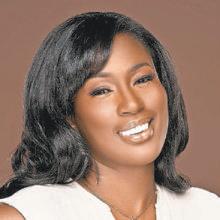
“We fight for freedom, justice and equality, meeting people where they are and helping them move from good to great,” said Nitasia “Spirit” Dupree, president of HAULYP. “During election periods, we canvass communities, host voter education workshops and explain legislative processes. Many people don’t participate simply because they
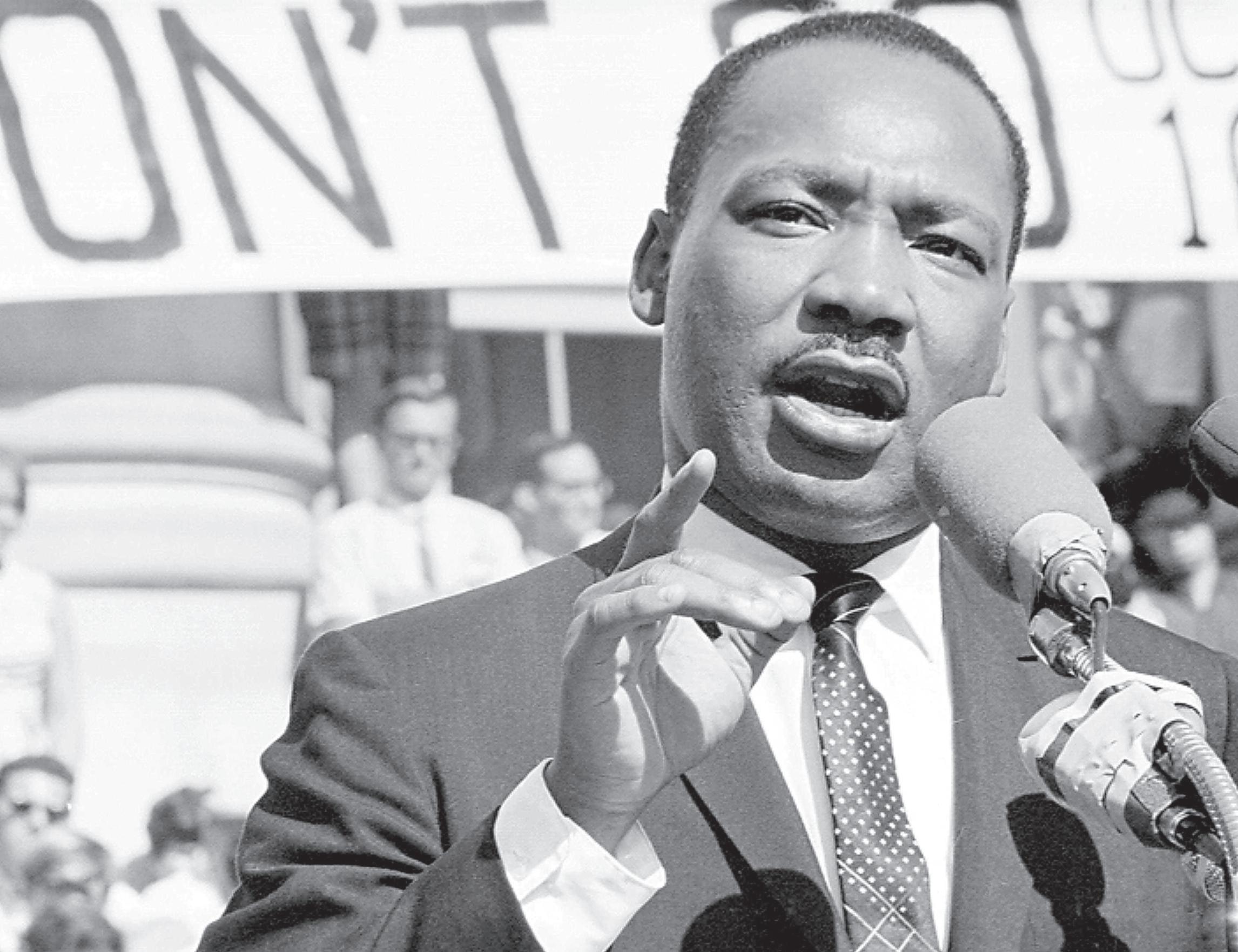
One of the Center’s standout projects tackles rural inequalities in Waller County, where food insecurity, lack of medical care and limited internet access persist.
“We’re developing a mobile app to connect residents with resources like the Houston Food Bank and transportation to medical facilities,” he said. “This is about bridging divides and ensuring everyone has access to basic needs.”
Community engagement is central to Robinson’s work. The Center collaborates with local churches and community centers to address pressing social issues while giving students hands-on leadership experience.
“Our students are the heartbeat of these initiatives,” he said. “We prepare them to leave Prairie View as change agents, ready to uplift their communities.”
“Many people don’t realize that they can still vote if they haven’t been convicted of a crime or have completed their sentences,” Fannin said. “This program reminds them that their voices matter, even in challenging circumstances.”


Amber Fannin, director of Field Operations and Community Engagement for Houston Justice, volunteered with the organization for two years before stepping into her current role in Spring 2024. She draws inspiration from the impactful programs spearheaded by the organization’s leadership.
“Our mission is to bridge the gap between elected officials and the communities they serve,” Fannin explains. “We empower individuals to advocate for themselves, especially within Black communities, by providing resources and education that foster self-reliance and systemic change.”
One of its flagship initiatives is Project
Fannin said Houstonians should anticipate an upcoming initiative—a TED Talk series in Third Ward—that aims to amplify local voices on topics ranging from real estate to reproductive rights.
“This program is about showcasing expertise within our community while fostering discussions that inspire action,” she said. They call on community members to step forward, share their expertise, and join in building the future Dr. King dreamed of.
“Dr. King’s message was about creating opportunities for everyone, and that’s what we strive for at Houston Justice,” she said. “We are working toward a society where Black and Brown communities are respected and represented in every arena—business, politics, and beyond.”

By Aswad Walker
Reverend Dr. Martin Luther King Jr. served as the spokesperson for an entire movement focused on making the impossible possible.
For roughly the first decade of MLK’s public leadership role, Black people in much of the country weren’t allowed to vote. Yet, MLK believed it possible and persevered until the Voting Rights Act was passed.
For Black people navigating 2025, facing the daunting prospects of a Trump administration many describe as anti-Black, many are asking a very relevant question. What’s possible for Black people in 2025 and beyond if we choose to work together?
Here’s what Houstonians had to say.
“I am generally optimistic concerning the status and progress of Black people. However, the pervasive and systemic disenfranchisement of our people has evolved into a more sinister clandestine operation of economic and education seclusion. Black folks need to pool resources and become and remain diligent in eforts to advance the education of our youth so we can bridge generational gaps with success as a commonality instead of the hit or miss plight we currently endure.” (Roderick Garner, Ft. Bend Co. Justice of the Peace Precinct 2, Place 1)
“In 2025 and over the next four years, I think our Black civic organizations, our Black faith-based organizations, we should all do an inventory of our principles, our values, and where we’re going to draw the line
as it relates to aligning with other groups, but in also how we maintain and prioritize the Black community.” (Tifany Tomas, Houston City Councilmember, District F)
us the divine energy to advance economically, politically, socially, culturally, and educationally. Black people must get back to our roots. We are the people of God.”
(Deric Muhammad, Activist)
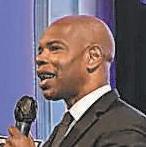
we stand united in purpose and action.” (Regina Gardner-Morgan, Activist)
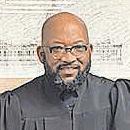
“If we work together we can resolve our economic challenges in small business, education, and resources. We spend more than any other nationality while investing the least in ourselves and in external investments to be able to pull from in times of need. This is our opportunity to spend our money internally and be able to demand the type of service we deserve.” (Teeba Rose, Entrepreneur)
SEE WHAT
BELIEVE IS AT STAKE IF WE DON’T WORK TOGETHER.



“It may sound cliché, however, anything is possible when we work together. Meaning, we can scale businesses together. We can mentor those coming behind us. We can collectively fnd ways to support, love, and grow healthier communities. People can actually be more and do more because of the power of support versus gatekeeping.” (Vannessa Wade, Media Consultant)
“In order for us to advance spiritually as a collective we must be willing to set aside religious differences and focus on the principles that grant us favor with God. We must fnd a way to pray together irrespective of religion. We must see “buying Black” as a spiritual practice, not simply economic. We must learn to fast collectively. We must learn to be charitable and kind to the least fortunate Black families. When we advance each other spiritually it gives
“I think for Black people in 2025, we have a great opportunity to recalibrate for ourselves. Over the last decades, we have been at the forefront of coalition building with other groups. The 2024 Election showed us that we are no longer in the coalition business: that other people no longer want to coalesce with us. So, I think we can look at this as an opportunity for us to focus on coalition building within our own community because we are not a monolith. We should have a handle on our Black disabled community, our Black labor community, our Black military veteran community, and faith-based communities. And we should learn the lessons from the Democratic Party in terms of all levels of education and all levels of economic strategy. We should start defning a new message for ourselves and building a policy that directly benefits the advancement and protection of Black people in America.” (Tifany Tomas, Houston City Councilmember, District F)
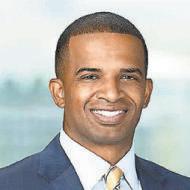
“If we work together, we can reestablish the selfess and resilient Black community that brought us this far. Getting back to our roots is our best chance to ensure that future generations do not lose their identity and will allow us to better amplify our collective voices in a way that will be heard from City Hall to Washington DC.” (Brandon Cofeld, Lawyer)
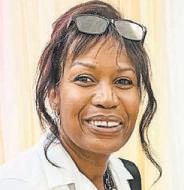


“A renewed dedication to cultivating and enriching our vibrant and dynamic culture is undeniably within our reach in 2025 – if
“Our liberation has always been a collective endeavor, a group project. “L’union fait la force” is the Haitian national motto and translates to “Unity makes strength” and this is our charge at this time. Our ability to survive is dependent upon our ability to become like mycelium—connecting each other to resources, sharing information between and amongst ourselves, and decomposing the remains of dying and dead ideologies, customs, ways of beings, and beliefs into nutrients that nourish the budding and sprouting of new worlds, new communities, new ways of being and relating. Our collective freedom—the ability to dream and realize those dreams in harmonious symbiosis where no one or no group of us must be lef behind or placed upon the bottom is possible. Just as much as the antithesis is possible, the need for us to collectively dream our most delicious dreams of thriving together is possible. Tis is not pure audacity, but the necessity of all freedom lovers. Tis collective power to create is ours to wield, and the time is now.” (Candice D’Meza, Liberation Coach) “Anything.” (Marcus Davis, Entrepreneur)
By ReShonda Tate
When we think of Dr. Martin Luther King Jr., we often picture his iconic speeches and his unwavering commitment to justice and equality. But behind the scenes of the Civil Rights Movement was a powerful force of women whose work was instrumental in advancing the cause. From strategizing marches to leading local movements, women like Coretta Scott King, Ella Baker, and Diane Nash were the backbone of the movement, ensuring Dr. King’s dream could take shape.
“African American women’s contributions to the Civil Rights Movement have long been overlooked, despite their pivotal role,” said Dr. Malachi D. Crawford, PhD, Associate Professor of History at Prairie View A&M University. “These women were not merely organizers or participants but influential leaders whose vision reshaped the movement’s strategies.”
Without Black women, there wouldn’t have been a Black freedom movement, and if the men would have opened up to their leadership, there could’ve been more progress, according to scholars and historians. Today, women continue to carry forward that legacy, pushing for equity and justice in Houston and beyond. As we honor Dr. King’s life and work, it is essential to recognize the women in our own community who embody his vision and keep his dream alive.
Often unsung, these women carry forward Dr. King’s vision, confronting modern challenges with courage and determination. Here are some of the incredible women locally who continue to make a profound impact in the ongoing struggle for equality.
1. Dr. Melanie Johnson
2. Dr. Bakeyah Nelson
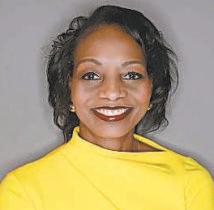
The executive director of Air Alliance Houston, Nelson is at the forefront of the fight for environmental justice in the city. Her work focuses on addressing the disproportionate impact of air pollution on marginalized communities, particularly in Houston’s historically underserved neighborhoods. Under her leadership, Air Alliance Houston conducts research, policy advocacy, and community engagement to improve air quality and reduce public health disparities caused by environmental injustices.


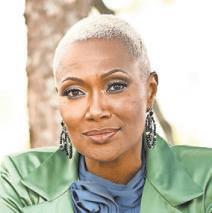

As President and CEO of the Collaborative for Children, Johnson is a visionary leader working to address educational inequities in Houston. Her organization is dedicated to improving early childhood education by providing resources, training, and innovative programs that empower teachers, parents, and caregivers in underserved communities. Johnson recognizes that access to quality education is foundational to breaking cycles of poverty and systemic inequality.
3. Kandice Webber
A passionate advocate for civil rights and social justice in Houston, Webber is the organizer of the March for Black Women and a leader within Black Lives Matter Houston. Webber tirelessly champions the rights and dignity of Black communities. She is also the founder of Houston Rising, an organization dedicated to addressing systemic inequities and amplifying the voices of marginalized people. Her work embodies Dr. Martin Luther King Jr.’s vision of justice, equality, and collective empowerment.
4. Jolanda Jones
Texas State Representative Jolanda Jones is a fierce advocate for equity, justice, and civil rights in Texas. As a legislator and a former Houston City Council member, Jones champions policies that address systemic disparities in education, criminal justice reform, and access to healthcare. Known for her no-nonsense approach, she uses her platform to amplify the voices of marginalized communities, especially those of Black and LGBTQ+ Texans.
5. Dr. Assata Richards
A transformative leader dedicated to empowering marginalized communities in Houston through research, advocacy, and action, Dr. Assata Richards specializes in community-based research that amplifies the voices of underserved populations, ensuring their needs and concerns are prioritized in policy-making and development initiatives.





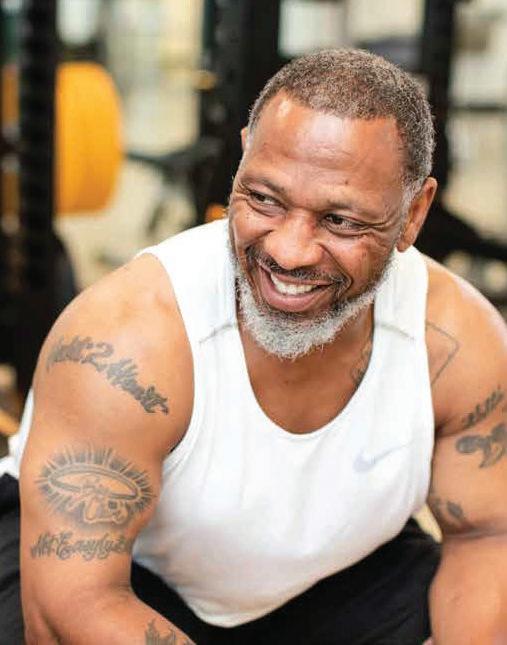


By Terrance Harris
Rockets forward Jabari Smith, Jr., the son of former NBA player Jabari Smith, probably never grew up wanting for much.
But he has always had compassion for those who are less fortunate, and because of that, he understands the importance of giving back to them —not just monetarily, but with his time and presence.
“I’m in a position to help and you have to find the best way to do that,” Smith said to the Defender. “Find what you want to invest into and put your time into it because there are a lot of problems in the world and I feel with our position and status that we can help put things out and give things back.”
As this nation gets set to celebrate the birthday of civil rights icon Reverend Dr. Martin Luther King Jr., there is little that highlights his work more than volunteerism and giving back to the community. Athletes, who are admired by people across all spectrums, have been looked to for decades to give back to the communities they serve and grew up in.
Black athletes, in particular, have almost always been expected to use their riches and platforms to give back to the communities that idolize them.
“I used to be that kid, looking up to people who played professional sports and people who are older,” Smith said. “Just being here and putting a smile on their face means a lot to me.”
We’ve seen some of the grand gestures made by top athletes like LeBron James, who sends kids to college, hosts an annual bike ride back in his hometown of Akron, Ohio and a few years ago opened a state-ofthe-art college preparatory school for underprivileged kids where he grew up. But some, like Michael Jordan, have been quieter contributors to causes they feel strongly about.
Almost across the board, other athletes still give back in their own way, whether hosting a back-to-school backpack drive, cleaning up in the community after natural disasters, participating in toy and food drives during the holiday season or sending money to support various charities.
Locally, athletes like the Rockets Jalen Green, Dillon Brooks, Amen Thompson, Steven Adams and Smith, and
Texans C.J. Stroud and Dameon Pierce are particularly visible in the community. The Rockets, Astros and Texans have been particularly active in putting their athletes and leaders out for various volunteer projects.
Many athletes feel it’s important to show those less fortunate that they care. Smith conducts charitable giving, such as back-to-back school backpack drops and toy giveaways, via his Jabari Smtih Jr. Foundation.
“That’s instilled in me. I’m a giver,” Smith said. “It’s hard for me to say no to anybody. That’s just who I am, that’s who my dad is, that’s who my family is. So that’s just what I try to do.”
The same can be said for new Prairie View football coach Tremaine Jackson, who stated early in his introductory press conference last week that his student-athletes along with everyone else involved in his program will get out and serve the community. It’s what the Houston native has done at his previous stops and looks to continue with the Panthers.
“We are going to get out in this community, whether it’s Waller County or Houston and if you need us to move, pick up something or help somebody that needs some help, because how dare we expect people to support us and we’ve done nothing to support them,” Jackson said to an audience of Prairie View supporters.
Jackson said in the past his athletes at Valdosta State helped with housing projects, clean yards and assist elderly. He plans to bring that sense of supporting the community to The Hill.
“We don’t want to just go to schools and do Hi-Five Fridays. That’s cool, but we feel like we can work a little bit,” Jackson said. “So we will find out who needs some help. Where is the widow who needs a little help?”
In Jackson’s mind, it’s the least that others who are more fortunate can do.
“I think it’s real important. How dare we want people to come to the game and they don’t even know who you are,” Jackson said to the Defender. “The way (to fix that) is to give something back to them, and when you give they will be giving back to you.
“Here is what I will tell you, it’s better to give than to receive. So we want to make sure we give ourselves and we give our time and give our program to the community.”
By Terrance Harris
There is a lot we think we know about University of Houston basketball coach Kelvin Sampson.
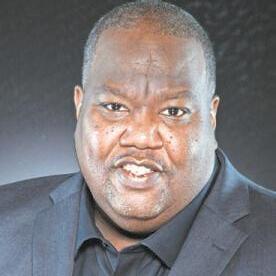
We know the story of his upbringing in the Lumbee Native American community in North Carolina. We know about his evolution into one of the greatest college basketball coaches. We’ve watched him do a remarkable job of transforming the Cougars back into a national power program.
But what probably goes unnoticed is the behind-the-scenes work Kelvin, his wife Karen, daughter Lauren and his basketball team do in the background to make our community better. Sampson and his family have long embraced the value of giving back and reaching out to people in their time of need.
That’s why it hasn’t been uncommon to see his players, such as Jacob McFarland, Joseph Tugler, Cedric Lath, LJ Cryer, Emanuel Sharp, Terrance Arceneaux, and others, spending time at places like the Texas Children’s Hospital, putting smiles on the faces of kids who are in the fights of their young lives.
“It’s important,” Sampson reflected recently. “The success you have in basketball or if you have a successful program, that’s great. But the experience our kids get to see when those kids’ eyes light up … When we walk into the room and they have an IV in their arm or leg or their foot, and their parents have been there for 75 days waiting on their little girl or little boy to get better, I think it’s a valuable lesson that we’re playing a sport and it’s fun but life is going on all around us.
“I will say this, our kids come from such great families that they are all awesome in that environment.”
Interestingly, Sampson also comes from a great family that instilled in him the importance of helping others and volunteering. Sampson recalled how his mother, who was an RN, after retirement worked at a hospice facility. Sampson was just starting his career as a young assistant coach and his mom would often ask to save all of the free lotions, shampoo and toothpaste from the various hotels he would stay in and then bring them all to her each spring to give out to the patients and their families.
“So I got that from my mother because she was like that. Her mother was like that,” Sampson said. “They would go around and collect clothes. Back then they didn’t have donation stations. My grandmother would go around door-to-door asking if they had clothes that their children had grown out of because there are some families with kids who couldn’t afford it. So I had good teachers.”
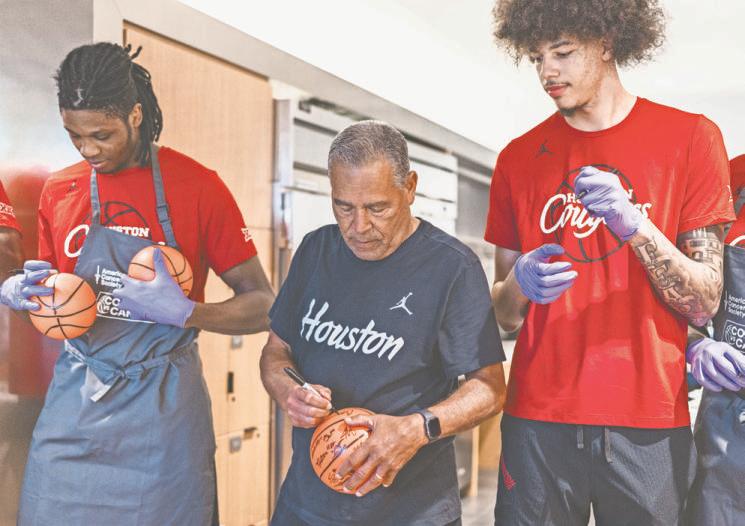
By Aswad Walker
The book Stolen Identity tells of a Black youth who was sucked into the criminal legal system behind a false accusation. His inadequate counsel and lack of support system landed him in prison, which could have been the end of his story. It wasn’t.
That experience launched Houstonian RoShawn Evans into his life’s work as a crusader for pure justice.
Literally.
In 2016, Evans and Sasha Legette founded Pure Justice, a local advocacy organization dedicated to reforming economic, racial and criminal justice.
Though Evans wrote his personal story in Stolen Identity and three other books, his primary job is serving as Pure Justice’s organizing director. Translation: fighting for justice is Evans’ 9-to-5.
“This is all I’ve got. Advocacy, organizing, bringing people together, this is me,” he said. “This is what you’re gonna get. I feel like I am blessed to be in a position to get paid to do what I’m gonna do anyway.
“I get paid to be who I am. I’m not coming to a job that I hate, or that is putting me in a space of doing things I don’t wanna do.” Evans, in all honesty, wishes he didn’t have to do the work that has come to define his essence.
“It sometimes infuriates me to know that we are still fighting for the things that I read about in history books that my ancestors fought for,” he said. “These people have been alive and dead and gone, and we’ve still got a lot of the same battles. But I feel good that the community trusts me to speak for them and that the community trusts me to rely on me.”
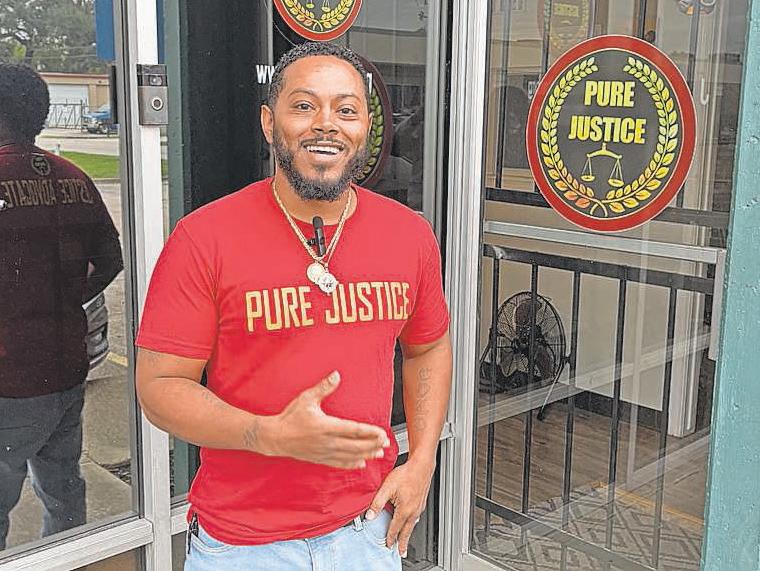
Besides regularly being the first one in the office every morning, and the last to leave at night, there’s nothing regular about Evans’ day-to-day schedule.
It sometimes infuriates me to know that we are still fighting for the things that I read about in history books that my ancestors fought for.”
ROSHAWN EVANS
In the office, he might be leading meetings with partner organizations strategizing on maximizing their collaborative strength. Or he could be checking Pure Justice’s “Big Board,” which has proprietary information about people’s open cases, including their lawyer, case courtroom and judge.
“We periodically call the lawyers to see if they need anything, to see if we can assist them,” he said.
One of the most impactful actions Pure Justice takes is creating character letters or character videos as part of its “Participatory Defense” work. Those letters and videos allow judges and juries to see defendants the way their family, friends, and community see them. It’s a community-driven form of defense that has gone national and is having positive results by
pulling community members together to flex their muscles.
Evans’ day-to-day also involves being called out to visit the Harris County Jail to ensure pretrial incarcerated individuals are registered to vote. Evans and his Pure Justice team also conduct “boots on the ground” research on over 400 Harris County apartment complexes, regularly adding to their massive and detailed database that lets them know which complexes will rent to formerly incarcerated individuals and which ones won’t.
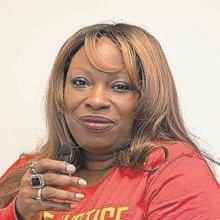
focus is on the community. He knows the trauma that our community suffered and the resources that are lacking. He’s reaching out, always wanting to know what is it that you need,” said Pure Justice’s Field Manager Joy Davis.



Joy Davis
One challenge Evans sees in his work is the lack of “enough people in the fight to create the change we need because of fear or thinking that things won’t change regardless of what we do.”
Almost everyone who has met or worked with Evans comes away with the same assessment – he’s 24/7 about “Justice for all.”
“RoShawn never sleeps. He is always pushing you to become a better advocate, to become better at what you’re doing. His
“They don’t understand the power of people power, and we get beat up by both sides of the aisle. But one of the things that is great in this work is just watching the people who actually believe that change is possible. When I see the people who actually come out trying to figure out how to create real safe spaces for everybody, not just themselves, but how to change the system so it could work for everybody, it is rewarding even when our wins are small.”
By Terrance Harris
Tremaine Jackson certainly talks a good game.








During his introductory press con ference as the new Prairie View football coach, Jackson sounded like part preacher and part wheeler-dealer as he promised a packed room of alumni, boosters, adminis trators, and former football players every thing imaginable.


The former Division II Valdosta State coach and Texas Southern alumni said he will deliver the Panthers to the SWAC Championship, the Black College Football National Championship Celebration Bowl, and FCS prominence.
But most importantly, the man dressed in a black suit with a purple tie, black shoes, and bare ankles promised that come the season-opening Aug. 30 Labor Day Classic, the Panthers will again reign supreme over rival Texas Southern.

“I’m not talking big,” Jackson said. “I’m telling you what’s going to happen.”
Fresh off leading Valdosta State to the Division II national championship game, Prairie View announced Jackson as its 35th head football coach, replacing Bubba McDowell. His official start date was Jan. 1.
In a 10-minute introductory speech, Jackson provided plenty of bulletin board material for his contemporaries in the SWAC, HBCU football and the entire FCS.
“That’s fine. We understand that,” said the 41-year-old Jackson, who was named the AFCA Division II National Coach of the Year this past season after leading the Blazers to an undefeated regular season and FCS national championship game. “Let me tell you again, we are going to get on I-10, go toward I-20 because that’s the shorter way. We are going to go to Atlanta. Our fans are going to take over Atlanta and we are going to have a good time and we are going to win the Celebration Bowl and we are going to stay an extra day just because we know what’s happening later on that night.”
Jackson takes over a Prairie View program that is a year removed from winning the SWAC West Division title and competing in the conference championship game under McDowell. However, following two relatively successful seasons, McDowell’s team struggled this season to a 5-6 overall
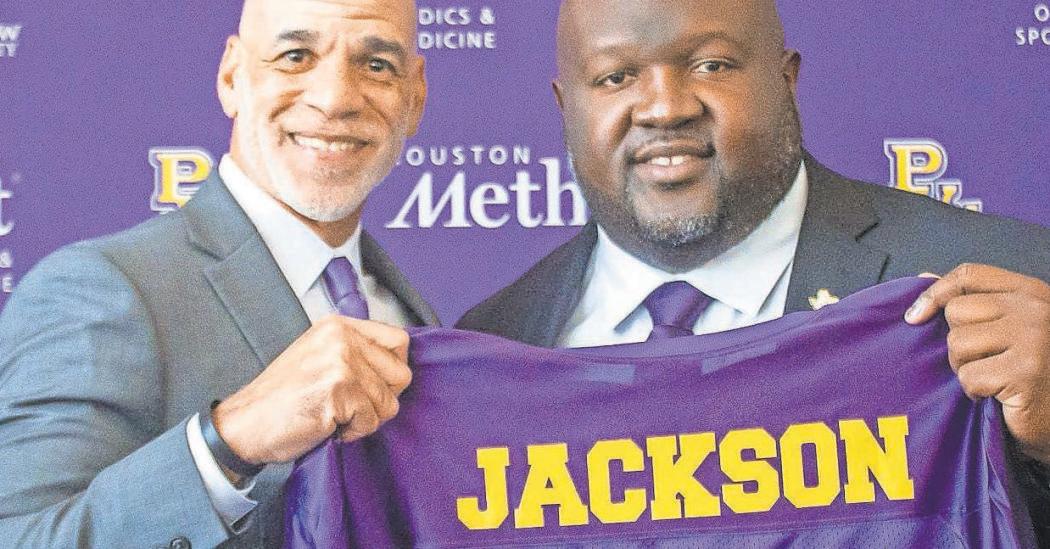

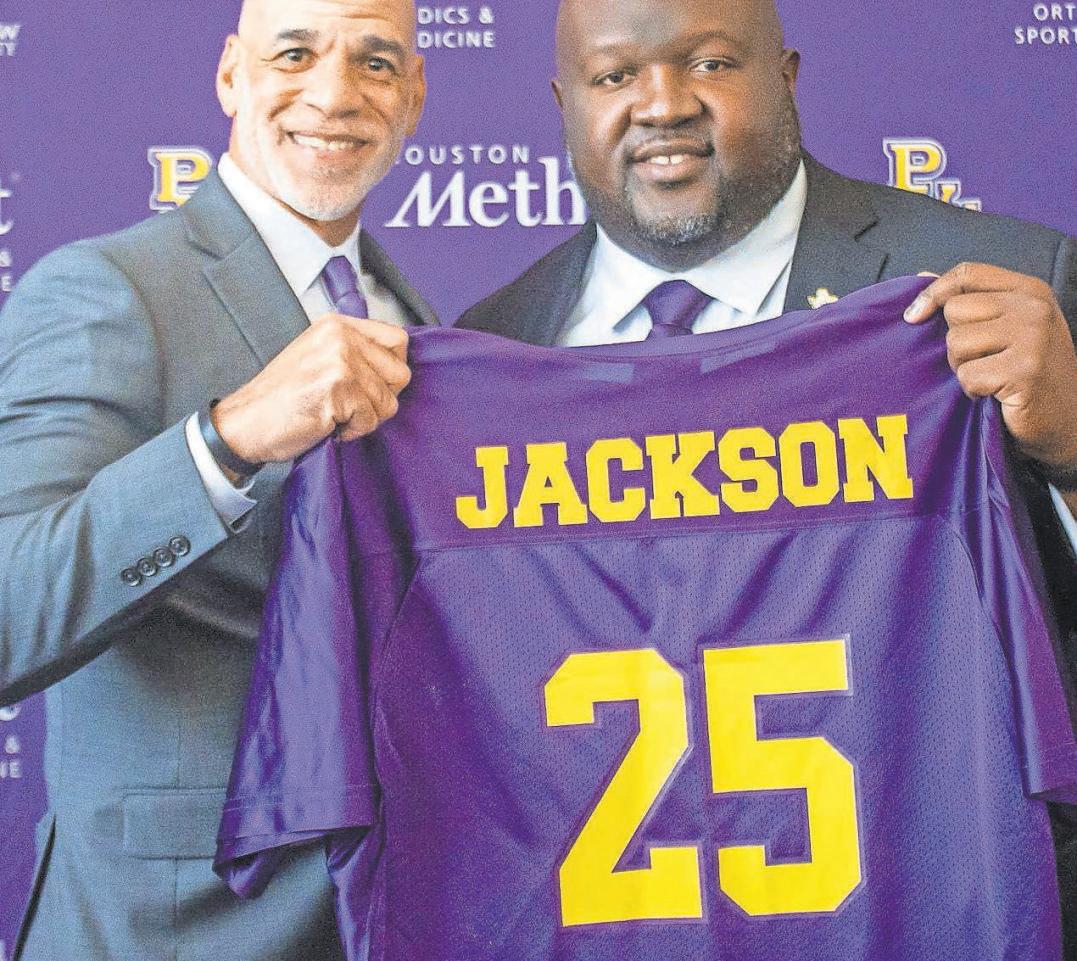
and 3-4 league record. His three-year contract wasn’t renewed.
Few specifics have been given about what caused McDowell, a former safety with the Houston Oilers and a longtime assistant coach at PV, to lose favor. But all kinds of hints were dropped Tuesday, such as a lack of discipline, the inability to win the conference championship, not winning enough in the non-conference, and perhaps most unforgiving, being on the losing end of the Labor Day Classic to rival TSU this past season.
McDowell had some success but clearly not enough for the folks at Prairie View.
“To me, being moderately successful ain’t why I came here,” said Prairie View athletic director Anton Goff. “My president didn’t hire me to be moderately successful.
“So, I looked at it and looked at where the program was and where I wanted it to go and I just felt like I needed a change.”
Goff hired a search firm to help identify Jackson as a potential candidate. But it was clear that a connection was made once Jackson met with Goff and President Tomikia P. LeGrande. Jackson admits he couldn’t stop thinking about the PV job despite preparing the Blazers for the
national title game.
Jackson feels that with the facilities Prairie View has to offer, particularly Panther Stadium, he can transform the Panthers into a power in the near future. He just needs total buy-in and, of course, money from the boosters and supporters.
“That’s a great question. How fast we go, depends on how fast everybody buys in,” Jackson said in response to the Defender’s question of how long. “I know the administration has bought in because we wouldn’t be at this point if we all weren’t bought into one another. So I’m bought into the University and department and I know that they believe we are going to do what we said we are going to do.
“The question on that is the players and you guys (addressing the alumni, boosters and former players). How fast are you going to buy in? Are you going to keyboard it or are we going to write checks? Are we going to support these guys regardless of who are playing or are you only going to come to the popular games and Homecoming? How fast, depends on you.
“In the words of Martin Luther King: How long? Not long if you and the people in our program buy in today.”
Prairie View’s administration liked Jackson’s teams’ discipline and his background as a head coach at Colorado Mesa, a defensive line coach at Texas State, and a defensive coordinator at Abilene Christian.













“There are two things about Coach. One, his record on the football field, recruiting kids and developing them to be champions on the field,” LeGrande said to the Defender. “But also his commitment to making sure they are champions in the classroom, because when you look at the rate of athletes who go on to professional sports, that percentage is low. So, we want to make sure we are preparing these students for life.
“He brought both of those things and a commitment to win. And to me, a commitment to win at Prairie View means making sure our institution is a premiere institution on and off that field.”
Jackson and Goff talked about their open discussions and the aligning of goals and visions they shared despite being members of different fraternities. Goff is a member of Kappa Alpha Psi and Jackson is a man of Omega Psi Phi.
“I like the way our values aligned just through conversation,” Goff said to the Defender. “It wasn’t about him researching something and spitting back something. We had real man-to-man conversations, we had AD-to-head coach conversations, we had Kappa to Que conversations.
“Every single role that I had and he had, we had those conversations over the whole process and I loved to getting to know him better. It was so natural for me to choose him and I just wanted him to choose me. We chose each other.”
Jackson was equally impressed with Goff.
“My man, one of the only Kappas I mess with,” he said as the crowd erupted in laughter. “AD Goff, man thank you for our conversations and your support during the time we are in.
“It ain’t easy. It’s not normal to have the alignment that you were talking about,” said Jackson, who was 30-9 in three seasons at Valdosta State. “I’ve been at places with no alignment. The vision that AD Goff has and what we are trying to get done, it’s going to make it real easy to come to work every day. So I appreciate you.”
By Jimmie Aggison
Behind every great athlete is a source of unwavering support, and for Wheatley High School junior guard, Jamie Solomon, that person is her grandmother, Bridget Goudeau. More than a guardian, Goudeau has been a guiding light, coach, and number-one fan in Jamie’s life, shaping her into the accomplished student-athlete she is today.
“My grandmother is like a mother and a grandmother to me,” said Solomon. “She’s always guided me in the best interest of what she feels is right for me.”
When Solomon was a young child, Goudeau became her legal guardian, stepping in during a difficult time. From that moment, Goudeau dedicated herself to giving Solomon and her siblings a foundation built on love, support, and encouragement to dream big.
From the sidelines at track meets to the stands at basketball games, Goudeau hasn’t missed a single moment of Solomon’s athletic journey.
“I haven’t missed any track meets, basketball games, or practices; it would kill me to miss any of them,” said Goudeau.
Her dedication stems from her own experiences growing up without such support.
“It’s important for me to always be present because I didn’t have that when I was younger,” said Goudeau.
This presence has meant everything to Solomon, who draws strength from knowing her grandmother is always there, cheering her on.
Solomon’s athletic career began with track & field, where she ran the 200-meter dash, 4x100-meter relay, 4x400-meter relay, 400meter dash, and long jump, earning her a spot at the Junior Olympics. But as scheduling conflicts arose, Solomon transitioned full-time to basketball, a decision made with her grandmother’s guidance and support.
When Solomon’s skills caught the attention of Bianca Taylor, the wife of the Houston Hoops organization’s head coach, Goudeau didn’t hesitate to help her grandaughter seize the opportunity. A video of Solomon playing in the neighborhood was all it took to secure her spot on the team and launch her basketball career.
“Jamie’s drive and cuts to the basket were beyond her years,” said Taylor. “This 7th-grade girl played with grit and fearlessness. I had to have her join our Hoops family. At the time we had 16u and 17u only, so I created a 12u middle school team so she could play.”
Solomon continued to work on her game throughout the years. After her name and game
began to generate buzz, she started training with Tommy Mason Griffin, a former Madison High School and University of Oklahoma standout. The objective was to work on her off-ball movement and develop Solomon into becoming a prolific guard who could shoot the ball consistently.
As a junior Solomon has blossomed into just that, averaging 22.5 points per game, shooting 82% from the free throw line and 44% from the three-point line. Her success is a testament not only to her talent and hard work but to the foundation of encouragement her grandmother has provided.

Goudeau’s influence extends beyond the court. She instills life lessons that guide Solomon in everything she does.
“Always have more than one option and focus on what can be done to better yourself,” Goudeau tells her.
These words resonate deeply with Solomon, who balances her athletic pursuits with a 3.6 GPA and a commitment to academic excellence.


As Solomon looks to her future, including a recent unofficial visit to the University of Texas at El Paso, she knows her grandmother’s unwavering support will remain her anchor. Whether it’s reminding her to keep her grades up or simply being there at every game, Goudeau continues to be Solomon’s most steadfast advocate.
“My grandmother inspires me every day,” said Solomon. “She’s taught me resilience and shown me what it means to have someone truly in your corner.”
For Solomon, success isn’t just about points scored or games won; it’s about the enduring bond with the woman who has been her biggest fan, her loudest cheerleader, and her greatest role model.

Class: 2026
IG: @adore.jam1eee
Twitter: @solomon_jamie3
Position: Guard
Height & weight: 5-feet-7, 126
pounds
Favorite artist: Bryson Tiller
Status: Uncommitted
